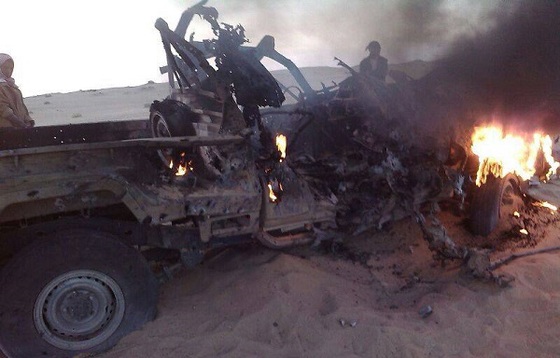Late last night a US drone strike killed four al Qaeda commanders and fighters in Marib province east of Sana'a, the Yemeni capital. The strike is the third in Yemen so far this month.
Arabic media reports indicate that the drones fired two missiles at two vehicles carrying al Qaeda operatives as they traveled in the Wadi Abida area of Al Shabwa district in Marib.
The two al Qaeda leaders confirmed killed in the attack were identified as Ebad Mobarak Al Shabwani and Ja'afar Mohammad Jaber Al Shabwani. Ebad and Ja'afar were not on Yemen's most recent list of wanted al Qaeda leaders. The identities of the other two killed in the strike were not confirmed, but Arabic new sources suggest that they too were members of al Qaeda.
The Al Shabwan tribe has been recurrently involved in al Qaeda activity in the country, and drone strikes have targeted a number of the tribe members. Most recently, Mujahid Jaber Saleh al Shabwani, an AQAP leader who had returned from fighting in Iraq, was killed in Shabwa province by a US drone strike [see LWJ report, US kills 3 AQAP operatives in Yemen drone strike]. AQAP is known to operate in Shabwa province, where much of the Shabwan tribe is based. Most of the province was under AQAP control between May 2011 and May 2012.
The US has targeted AQAP in Wadi Abida in Marib four other times in the past. The last strike in Wadi Abida took place on Jan. 23, 2014; four AQAP fighters were reported killed in the attack. Two of the strikes took place in 2013 and the other in 2012. A few years earlier, in March 2008, Wadi Abida was identified as the base of an al Qaeda group known as the Yemen Soldiers Brigade. The group claimed credit for mortar attacks against the US Embassy, the Italian Embassy, and a Western housing complex in Sana'a in 2008.
Background on US strikes in Yemen
Last night's strike is the third by the US in Yemen in the past eight days. On March 3, US drones killed Mujahid Jaber Saleh al Shabwani and two other jihadists in a strike on a vehicle in the province of Shabwa. Al Shabwani was on the Yemeni government's list of 25 most wanted. And on March 5, the US killed Ali Saleh Juraym Al Olyan, an AQAP commander in the northern province of Al Jawf. He had previously fought alongside al Qaeda in Iraq.
In addition to the three strikes this month, the US has launched three other strikes in Yemen this year; all three were in January.
The pace of the drone strikes in Yemen decreased last year from the previous year (26 in 2013 versus 41 in 2012). The reduction in the number of strikes coincided with a speech by President Barack Obama at the National Defense University in May 2013. The strikes are being reduced as the US government is facing increasing international criticism for conducting the attacks in both Yemen and Pakistan.
The number of strikes might have been much lower in 2013 were it not for an al Qaeda plot emanating from Yemen that was uncovered by US officials in late July. The plot led the US to close down more than 20 embassies and diplomatic facilities across Africa, the Middle East, and Asia. The plot involved AQAP emir Nasir al Wuhayshi, who now also serves as al Qaeda's general manager.
Between July 27, after the plot was disclosed, and Aug. 10, the US launched nine strikes in Yemen; no drone strikes were reported for seven weeks prior to July 27. The burst in attacks was intended to disrupt the plot and take out AQAP's top leadership cadre and senior operatives. The US killed Kaid al Dhahab, AQAP's emir for Al Baydah province, during that time period.
For more information on the US airstrikes in Yemen, see LWJ report, Charting the data for US airstrikes in Yemen, 2002 - 2014.
